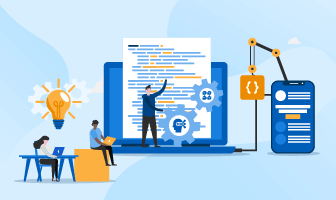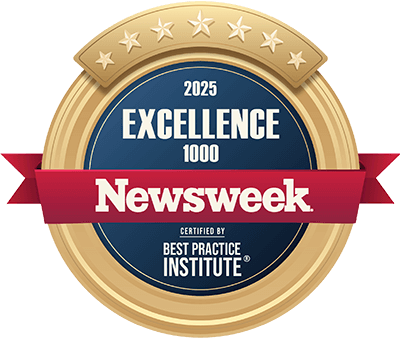Software Development for Startups
Let’s Co-Create Products that Meet Market Needs
ScienceSoft is inspired by the immense possibilities that startups open for individuals and the business world. Have a product idea that excites you? ScienceSoft is ready to develop your product and realize the full market value you envision, no matter the budget and time constraints.


How Fast You Can Release a Product with ScienceSoft
By bringing extra heads and hands to your project, you can move on with your product idea much faster and grab the market opportunities before your competitors do. The timelines surely depend on your product’s complexity, but our average speed is:
2–4 weeks for a prototype
You can use a clickable prototype to sell your product idea to investors and fundraise or to test the idea with representative users.
2–6 months for an MVP
You can launch an MVP to collect the feedback from early adopters and know what they lack in a product.
1 day–2 weeks to deliver new features
You don’t have to wait for major product releases and have new functionality launched fast.
How We Develop Software for Startups
From Startup Idea to Market-Ready Product: Recent Story
In a short video, Yolanda Mack, Founder and CEO of GlamRush2U, and the ScienceSoft’s team share brief reflections on the early stages of product development. ScienceSoft supported GlamRush2U with application design and MVP delivery. See the full story via the link.
Our awards, certifications, and partnerships
How ScienceSoft Makes the Startup Journey Easier
Our team of 45 certified project managers is trained to keep startup projects on track. We are adept at tackling unique challenges your face, such as limited budgets, ever-evolving requirements, and tight deadlines. Our approach prioritizes risk management and transparent, honest communication.
Discover our key practices aimed to help you overcome obstacles and achieve your vision, whether you're in the ideation phase or ready to scale.
Discover how we dig into your requirements and expectations at the discovery stage to plan the project, provide realistic cost estimation, and save you from extra fundraising rounds caused by budget overrunning.
Learn what project documentation we create to facilitate your further maintenance of the product. Along with standard documentation, we can create software-related documents for investors (e.g., a white paper).
Discover how we pick the best candidates for the needed roles and organize the team.
Check the steps we take to proactively recognize potential risks and effectively tackle emerging challenges throughout the SDLC.
Learn our structured approach to assessing and implementing feasible high-value change requests without excessive bureaucracy.
Check the KPIs we use to objectively evaluate cooperation health and learn our practices for joint success assessment.
Learn how we manage the project time effectively to bring your product to the market just in time.
See what we do to realistically estimate the budget needed to create your product and surely meet the agreement.
Check how we protect you from feeling dependent on our services. You can leverage our expertise at any stage of your product development and choose to proceed the work internally or with another vendor.
3 Simple Steps to Start
Book a call
You book a call with our product team at a convenient time.
Meet our team
After we sign an NDA, you share your product idea and ask questions you are interested in.
Get a plan
We lay out a plan of how we can help you evolve and realize your product idea.
Exciting Product Capabilities to Help You Fundraise and Amaze
Our goal is not to advertise these exact capabilities but to show you diverse possibilities we use to increase the product’s value.
Multi-user communication
encompassing private messaging, group chats, voice and video communication, and collaboration tools.
to process and act on real-time personal data (e.g., from wearables) or data about the environment (e.g., from smart home devices).
Multilanguage interface
not only translated but also adjusted visually to different language systems (e.g., left-to-right and right-to-left systems).
Hyper-personalization
based on AI and real-time user data.
to extract information (e.g., data patterns, object classification) from visual and video files without human intervention.
Accessibility
to make software convenient for people with different visual, mobility, and cognitive abilities.
Location-based services
to serve geography-specific information to users.
capable of interpreting historical and real-time data and making informed predictions.
Learn Average Costs and Request a Tailored Cost Estimate
The cost of prototype development falls within the range of $2,000 and $5,000. It includes the creation of a clickable mockup of the interface.
The cost of MVP development ranges more widely between $40,000 and $300,000. It implies the creation of a market-ready product with limited functionality.
When trying to develop an MVP, startups may fall into a trap known as just-one-more-feature. The reluctance to sacrifice even a minor feature quickly leads to the scope of MVP extending, the cost inevitably growing, and the development time going beyond planned several months.
To stay within the idea of a minimum product, we select must-have features that form the core of your product and add features that make up your unique selling proposition. As a rule, that’s enough to enter the market with a competitive edge in your favor.
Estimate the Cost of Software Product Development Services
Please answer a few questions about your needs to help our experts calculate your tailored quote quicker.
Thank you for your request!
We will analyze your case and get back to you within a business day to share a ballpark estimate.
In the meantime, would you like to learn more about ScienceSoft?
- Project success no matter what: learn how we make good on our mission.
- 4,200+ successful projects: explore our portfolio.
- 1,400+ incredible clients: read what they say.

How You Benefit from ScienceSoft’s Approach
Software development for startups is aimed at helping young companies translate their fresh, disruptive, innovative ideas into market-ready software products. This is how we make the journey easier for you.
Development agility
We quickly respond to changing requirements: we can shift the priorities in feature development or plan new value-adding features. This allows us to do what’s best for your product instead of blindly following the initial plan.
Proactivity and sincere commitment
Protection of intellectual property
We sign an NDA when we only start negotiating our potential partnership, so your product idea is protected either we are hired for the project or not. We also outline any sensitive matters (e.g., your full ownership of the code) in the service agreement.
We Answer Your Questions and Concerns
What should I do if I have just a rough product idea so far?
If you don’t have any particular development plans right now, it may be early to engage software developers for startups. You may benefit more from consulting at this stage. Studies show that more than 30% of startups fail due to a lack of product-market fit. So, we can start from analyzing the competitive market and proving the feasibility of your idea. Then, we can decide which product version you need right now – a proof of concept, a prototype, or an MVP (we described the difference here) — and go ahead with the development.
I’ve started the development of my product and now I’m considering changing the vendor. Still, I don’t want to postpone the market entry for long. How much time will you need to understand what has been done and continue?
It depends on the state of project documentation and the quality of fulfilled work. If everything is fine, the onboarding can take 1–2 weeks. If we need to collect the knowledge by pieces and audit the previous work, the onboarding will take longer (from 2 weeks and more, depending on the amount of work).
How will our routine collaboration be built?
Our key principle in collaboration is convenience and transparency for a client. So, we can plan our communication and reporting schedule in a way that doesn’t steal much of your time while keeps you constantly updated on the progress. In case your immediate decisions are needed, we will surely contact you outside the schedule.
Insights from Our Team

Prototype vs. MVP: Which One Do You Need?
Explore the difference and key advantages of these two stages of product development.

5 Reasons Why Startups Need Consulting
Get to know what product and business aspects you can discuss with consultants.

How to Build a Software Startup
Grab a plan for a startup launch with business models, possible competitive strengths, costs, and other valuable knowledge.
















